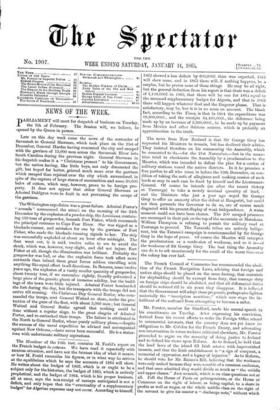The Wilmington expedition was a great failure. Admiral Porter's "
armada " commenced the attaer on the morning of the 24th December by the explosion of a powder ship, the Louisiana, contain- ing 210 tons of gunpowder, beneath Fort Fisher, which commands the principal entrance to Cape Fear River. She was rigged as a blockade-runner, and mistaken for one by the garrison of Fort Fisher, who made the blockade-running signals to her. The ship was successfully exploded at about an hour after midnight. The fleet went out, it is said, twelve miles to sea to avoid the shock, which was; however, very slight, and did not injure Fort Fisher at all, though the illumination was brilliant. Probably the gunpowder was bad, or else the explosive force took effect more outwards than inland, these great forces seldom travelling with anything like equal effect in all directions. In Benares, some twelve years ago, the explosion of a vastly smaller quantity of gunpowder, about twenty tons, if we remember rightly, literally pulverized a large piece of the granite ghaut of immense solidity, but the build- ings of the town were little injured. Admiral Porter bombarded the fort during the day, but the transports with the troops did not arrive till evening. On Christmas Day General Butler, who com- manded the troops, sent General Weitzel on shore, under the pro- tection of the guns of the fleet, with about 3,000 men ; but General Weitzel and General Butler agreed that nothing could be done without a regular siege, to the great chagrin of Admiral Porter, and re-embarked their troops. The failure is attributed in the North to General Butler, whose purely military plans,—despite the success of the naval expedition he advised and accompanied against New Orleans—have never been successful. He is a states- man with unfortunate military aspirations.






























